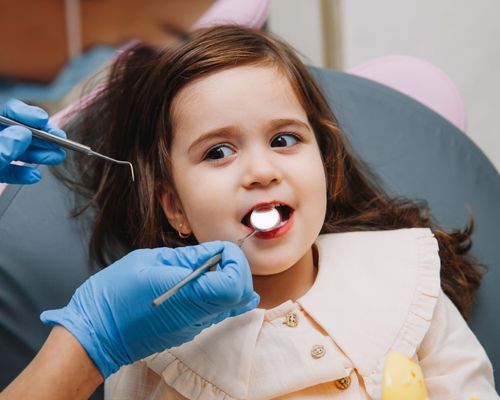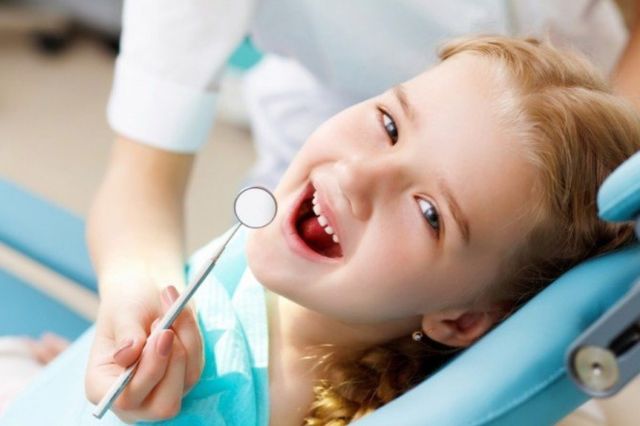Pediatric Dentistry
Healthy Kids guarantee a prosperous Nation
Healthy Kids – Healthier Nation
Almost 80% of the diseases which exists in the world are because of bad choices that we make. Little adjustment in our mind set and life style can completely eliminate them. It is said that prevention is better than cure. We all love our children the most and try to do what’s best for them. What better way to raise a child than ensuring his health. Our life style habits, diet and hygiene can not only save billions in health care costs but also raise much healthier kids. That in turn can make our nation more productive and healthier. Thus we ensure a better Pakistan. Key to all that is making investments in awareness and setting up a culture of prevention in our society.


WHAT is Pediatric Dentistry
The examination and management of dental health in children is Pediatric Dentistry. Deciduous teeth are not taken seriously in our society because people know they will be replaced eventually by permanent teeth. Milk teeth have a crucial role in proper eruption of permanent teeth. Premature removal of baby teeth can lead to misalignment of permanent teeth. Rotten deciduous teeth need to be restored, if possible, with restorations or stainless-steel crowns rather than being dealt with extractions. Kids who lose their deciduous teeth early in the age may also develop low confidence and self-esteem.
Prevention is better than cure.
Main Dental Concerns in Pediatric Patients:
- TEETHING:
The first Dental Visit:
The first dental concern of the parents is when their child has delayed teething. The first dental visit should be when the first tooth erupts and at the age of 18 months in case of delayed eruption. Timely teething is required for the skeletal development of the jaw, in weaning to solid foods and for proper speech development.
- BABY BOTTLE CARIES
ISSUE: Tooth decay in infants and very young children is often referred to as baby bottle decay.
CAUSE: Baby bottle tooth decay happens when sweetened liquids or those with natural sugars (like milk, formula, and fruit juice) cling to an infant’s teeth for a long time. Bacteria in the mouth thrive on this sugar and make acids that attack the teeth. At risk are children whose pacifiers are frequently dipped in sugar or syrup. Giving an infant a sugary drink at nap time or nighttime is particularly harmful because the flow of saliva decreases during sleep.
CONSEQUENCES: Baby teeth are necessary for chewing, speaking, and smiling. They also serve as placeholders for the adult teeth. If baby bottle tooth decay is left untreated, pain and infection can result. Severely decayed teeth may need to be removed.
If teeth are infected or lost too early due to baby bottle tooth decay, your child may develop poor eating habits, speech problems, crooked teeth, and damaged adult teeth. In addition, the chances that adult teeth will end up being crooked are greatly increased.
TREATMENT: Baby bottle caries need to be addressed as soon as possible. To prevent severe infection and loss of deciduous teeth, the pediatric dentist will remove the decay on the tooth and fill it with the filling material. However, the type of treatment will depend upon the extent of the decay and the age of the child.
PREVENTION: Baby bottle caries can be prevented by taking the following measures:
- Wipe the baby’s gums with a clean gauze pad or washcloth after each feeding.
- Begin brushing your child’s teeth, without toothpaste, when his or her first tooth comes in.
- Schedule regular dental visits by your child’s first birthday. Dentists also offer special sealant coatings, which can help prevent tooth decay in children.
- Never allow your child to fall asleep with a bottle containing anything but water and never give your child a pacifier dipped in anything sweet.
- GINGIVITIS
ISSUE: Gingivitis is bleeding gums, especially while brushing or flossing teeth. Bad breath and red and swollen gums are other symptoms of gingivitis.
CAUSE: Gingivitis is caused by plaque. Children with severe crowding and poor oral hygiene habits are at a greater risk for developing this condition. Other causes include Vitamin C deficiency, mouth breathing and tooth grinding.
CONSEQUENCES: If left untreated gingivitis can cause resorptions of the bone and ultimately lead to tooth loss.
TREATMENT: Gingivitis is treated by ultrasonic scaling as well as manual scaling in pediatric patients.
PREVENTION: This disease can be prevented by visiting the dentist when the first tooth erupts. The dentist guides the parents of the correct oral hygiene habits for pediatric patients as well as schedule the first hygiene appointment of the patient. The parents should supervise the brushing routine of the children and use soft bristles or electric toothbrushes.
- EARLY LOSS OF DECIDUOUS TEETH
ISSUE: Premature loss of deciduous teeth means when a milk tooth is lost due to either trauma or extraction before its time.
CAUSE: Premature loss of deciduous tooth can be due to root resorption or trauma in the anterior teeth and due to cavities in the molars.
CONSEQUENCES: Premature loss of deciduous teeth leads to loss of space for the permanent teeth to erupt. The main consequence is crowding in both arches which can lead to skeletal deformities that take longer treatment time later in life to correct. These skeletal abnormalities involve narrow maxillary arch and crossbite and overjet which leads to Class 2 and 3 malocclusion.
TREATMENT: Timely detection of the effects of premature loss can increase treatment options available and reduce the need of extensive orthodontic treatment later on. The main management of space loss prevention includes the use of space maintainer appliances at an appropriate age.
PREVENTION: Early tooth loss can be prevented by including good oral hygiene habits as soon as the first tooth erupts. In case of trauma, it is imperative to seek dental help as soon as possible to increase the life of the effected tooth.
- PARAFUNCTIONAL HABITS
ISSUE: Parafunctional habit in children include digit sucking, nail biting, bruxism, mouth breathing and tongue thrusting.
CAUSE: If psychological needs of children are not being met, they tend to act out and this can become prominent in the form of dento-oral parafunctional habits.
CONSEQUENCES: All these habits can lead to different outcomes which can cause major psychological stress to the patient. Major consequences are malocclusion, bruxism and sleep apnea.
- Malocclusion: Malocclusion is defined as dysfunctional craniofacial relations which may affect function, esthetics, and general well-being. It is one of the most frequent dental problems.
Malocclusion can present as anterior open bite or lateral crossbite, overbite or overjet. Untreated malocclusion can lead to dysfunctions of the oro-facial muscles and bone changes.
Severe early childhood caries is the leading cause of malocclusion as it can reduce arch space as well as cause asymmetrical facial growth. Early loss of deciduous teeth as well as periapical lesion in the primary teeth can lead to improper eruption of the permanent teeth which can lead to malocclusion.
- Thumb sucking can cause protrusion of the upper incisors and the premaxilla, atypical swallowing, anterior open bite, and posterior crossbite. Tongue thrust and lip sucking habits can cause malfunction of the facial muscles and growth of the upper and lower jaws which leads to malocclusion.
- Airways and Child Development: A much more serious condition with severe consequences than thought previously, sleep apnea is a result of Compromised Airway. Sleep apnea can be due to habitual mouth breathing, narrow palate, narrow tongue space or snoring. It can cause daytime fatigue, high blood pressure or heart problems, Type 2 diabetes, metabolic syndrome, complications with medications and surgery, liver problems, sleep-deprived patterns as well as learning difficulties.
- Habitual mouth breathing occurs due to obstruction of the nasal airways which may be caused by adenoid, rhinitis and hypertrophy of nasal turbinate. Open bite, a narrow maxilla, a deeper palate, and anterior cross bite can all result from mouth breathing. Low academic achievement has also been reported in habitual mouth breathers as compared to nose breathers.
- Narrow Palate: Narrow palate can be caused by tongue tie. Parafunctional habits like thumb sucking and use of pacifiers also contributes to the narrowing of a normal palate. Consequences of narrow palate include crossbites, and crowded teeth. All these concerns can be corrected by early interventions like frenotomy and palate expanders.
- Narrow tongue space and sleep apnea: The narrow tongue space reflects the narrowness of the mandible which compromises tongue space. During sleep, the reduced space causes falling back of the tongue into the pharynx which leads to obstructive sleep apnea. Crossbite due to malocclusion can restrict the growth of the lower jaw which also contributes to loss of tongue space.
- Tooth wear and chipping: Airway obstruction makes it difficult for a child to get enough oxygen while sleeping and the body responds unconsciously by moving the lower jaw forward to open up the airway. Hearing grinding sound at night means that there is habit of grinding and it leads to tooth wear and chipping. It should be identified and treated early to minimize damage.
- Snoring: Habitual snoring in children is indicative of a sleep disorder. Snoring can be due to constricted airway and developmental dental abnormalities. Impacts of childhood snoring include stunted growth, bed wetting, cardiovascular disease, obesity and ADHD. Snoring also contributes to a much complicated condition called sleep apnea.
The Nose is for Breathing, the Mouth is for Eating
TREATMENT: Sleep apnea in children is treatable. By getting to the root of the problem, either it is snoring, swollen tonsils or adenoids, dental concern, appropriate treatment options like surgery or orthodontic appliances can be used to treat sleep apnea.
PREVENTION: The dental and skeletal complications which result due to parafunctional habits can be prevented with early detection of these habits by the parents. Use positive reinforcement. Praise your child or provide small rewards – such as an extra bedtime story or a trip to the park – when he or she isn’t thumb sucking. Place stickers on a calendar to record the days when your child successfully avoids thumb sucking.
- Identify triggers. If your child sucks his or her thumb in response to stress, identify the real issue and provide comfort in other ways – such as a hug or reassuring words. You might also give your child a pillow or stuffed animal to squeeze.
- Offer gentle reminders. If your child sucks his or her thumb without thought – rather than as a way to get your attention – gently remind him or her to stop. Don’t scold, criticize or ridicule your child. To spare embarrassment in front of others, you might alert your child to the thumb sucking with a special hand signal or other private cue.
Stressful environment, parental separation, violent families, and lack of attention from parents have a major impact on the child’s psychology, making them prone to developing parafunctional habits. Thus, it is essential to counsel the parents regarding the same.
LONG TERM PSYCHOLOGICAL EFFECTS OF PEDIATRIC ISSUES
Children are at an increased risk of mental health issues and there is a direct link between a child’s mental health and dental health. If left untreated, prolonged dental health issues can cause lifelong psychological effects in children like low self-esteem and disturbed social relationships. All the issues that have been discussed above can be detected early. Regular childhood visits to the dentist will lead to early diagnosis and better treatment outcomes. Dental pain in children can cause sudden behavior changes which can lead to aggression and irritability. Aesthetic concerns due to malocclusion and dento-skeletal deformities cause social anxiety as well as low self-esteem which lasts a lifetime.
ANXIOUS PEDIATRIC PATIENTS
A patient carries childhood dental trauma with him for life. There are methods and behavior management options which can be utilized to make the dental visit for a child a pleasant experience. It is very important that the parents don’t inculcate a fear of the dentist in the young child’s mind. This can be done by understanding his needs and leading him to accept dental procedures. Demonstration or tell-show methods work very well for calming a child down.
Book An Appointment
You can request an appointment via completing the form below. Our staff will get back to you with availability best matched to your request. If you have a dental emergency please call us at 0323 400-01-01
Feel Free To Contact Our Friendly Reception Staff With Any Dental Enquiry.

Emergency Services
+92 323 4000101
